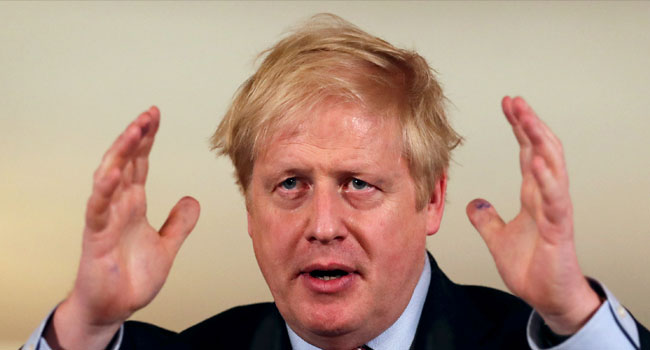By Jeph Ajobaju, Chief Copy Editor
Protesters have marched in the United States for the eighth straight night, with bigger crowds defying curfew in several cities to demand justice for the death of George Floyd, the unarmed black man killed by police in Minnesota on May 25.
A peaceful protest in front of the White House was tear-gassed by police on June 1 to enable President Donald Trump walk across the road to St. John’s Episcopal Church, from where he later emerged holding a Bible for a photo opportunity.
He has threatened to deploy the military to quell the outrage if widespread violence is not quelled. Nearly half of the U.S. has activated the National Guard, a reserved army used in emergencies.
The Floyd case has reignited deep-seated anger over police killings of black Americans and racism.
Demonstrators have taken to the streets – not only to express their outrage at the treatment of Floyd – but to condemn police brutality against black Americans more widely.
There have been calls, and a proposal from a U.S. lawmaker, to end the qualified immunity of police which prevents civil legal action against them. More generally protesters have called for an end to racism and discrimination, the BBC reports.
There have also been solidarity marches across the world, including in the United Kingdom, Denmark, The Netherlands, Germany, Australia, and New Zealand.
The shock and pain of the manner Floyd was murdered is particularly keenly felt in the black community in the UK, home to the second largest population of diaspora blacks after the U.S.
And they, joined by white symphatisers, have come out in droves to protest against rampant killing of African Americans which echo the mistreatment of blacks in London, Manchester, Birmingham, and other cities in the UK.
In London, police officers are four times more likely to use force against black people.
Pain felt close to home
Last weekend thousands of people chanted “Black Lives Matter” across the UK – at protests in London, Manchester and Cardiff.
Floyed died nearly 4,000 miles away from the UK in Minnesota, but his death was felt here too in the black community in the UK, according to the BBC.
That’s why people like Shayne defied UK government coronavirus guidance and went out to protest on the weekend.
“We didn’t expect that many people to turn up at the protests, it was mad,” the 20-year-old tells BBC Radio 1 Newsbeat.
“The general vibe was electric because you could literally see that everybody was hurt.”
Hurt one black, hurt all
Shayne says she and her friends wore military boots to the London protest and were impressed to see lots of other women dressed like members of the Black Panther movement.
“There were a lot of black women with their natural hair out,” she says.
“We wanted to show we’re proud of who we are and that we shouldn’t have to hide our blackness to stay alive.”
Shayne says although George Floyd was killed in the US, “we know that it happens here too,” citing the case of Mark Duggan.
He was a 29-year-old who was shot and killed in 2011 while police in London were trying to arrest him under suspicion of planning an attack and being in possession of a gun.
His death sparked riots in London, where police officers are four times more likely to use force against black people than white people, and later across the UK. An inquest jury in 2014 found that Duggan was lawfully killed.
In 2016, ex-Aston Villa footballer, Dalian Atkinson, died when he was restrained by police and Tasered in Telford, Shropshire.
Rasharn Charles died in hospital due to a cardiac arrest and obstructed airway during restraint from police officers in 2017.
Last week a public inquiry was announced into the death of Sheku Bayoh in police custody in Scotland in 2015.
Protesters in London held signs bearing their names, and the names of other black people who have died after encounters with British police, last weekend.
“It’s just very frustrating, I’m very angry and very tired. To constantly be hearing about black people being aimlessly killed for no reason is draining,” Shayne says.
“We have our issues within the black community but we are still very united.
“The prejudice that black people in America face is the same prejudice we face here. When one is hurt, we’re all hurt, because it could have been us.”
In America, protests have led to violent clashes between protesters and police.
The police officer who was seen with his knee on Floyd’s neck for nine minutes during his arrest for using a fake $20 note has been charged with murder.
Eyram Kiakia, who’s 20 and has a YouTube channel speaking about the UK Black Lives Matter movement, says she became more upset about the death of Floyd the more she learned about his life.
“I watched a few seconds of when they were kneeling on his neck but I wasn’t able to finish watching it, I was really upset,” she tells BBC Newsbeat.
“What upset me more was watching the videos of him as an activist and him being vocal about certain things in his community, they upset me more than the video of the police killing him.”
Racism in UK subtle yet pernicious
Eyram says people think the UK is more progressive on race than America, “when actually it isn’t”.
The UK Home Office was accused of racism following the Windrush scandal – when black people who came to Britain as children were wrongly told they were here illegally and deported or threatened with deportation.
“Race clearly played a part in what occurred,” the long-awaited review into what happened said earlier this year.
The Grenfell Tower fire in 2017 and the Windrush scandal were mentioned by rapper Dave when he called Prime Minister Boris Johnson racist during a performance at the Brit Awards after winning album of the year – causing Home Secretary Priti Patel to defend Johnson.
Eyram says racism in the UK is institutionalised and also evident in schools – where Black Caribbean pupils are more likely to be excluded than White British pupils – and the workplace.
“There’s a lot of more covert things that have happened to us and still happen to us, like when we were in school they policed black people’s hair, we weren’t allowed certain hairstyles or colours even though our white counterparts were able to dye their hair any colour,” she says.
“In the workplace, there’s always micro-aggressions. Everyone I know has experienced some sort of ignorant comment at the hands of a fellow employee or even an employer.
“Just because it’s so subtle and it’s not overt, it doesn’t mean it’s not racist.”













